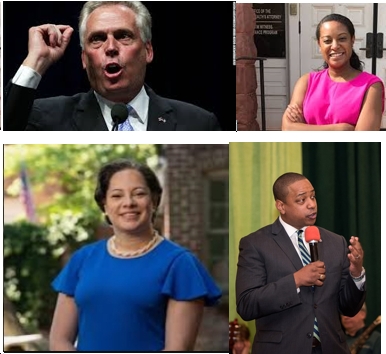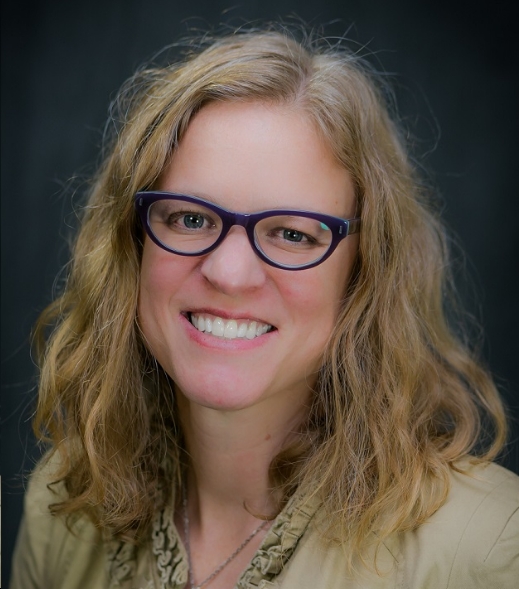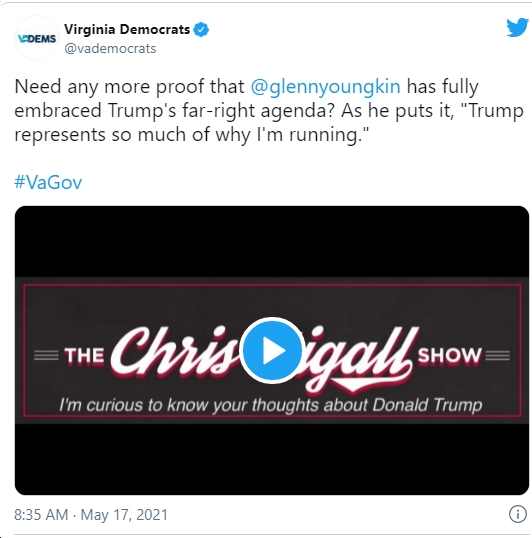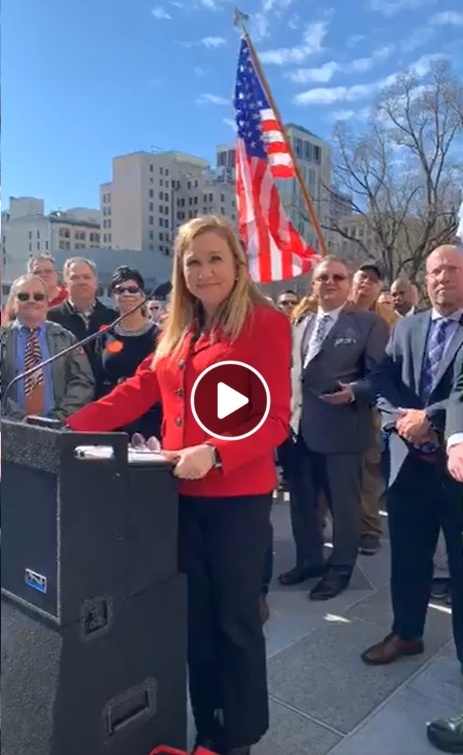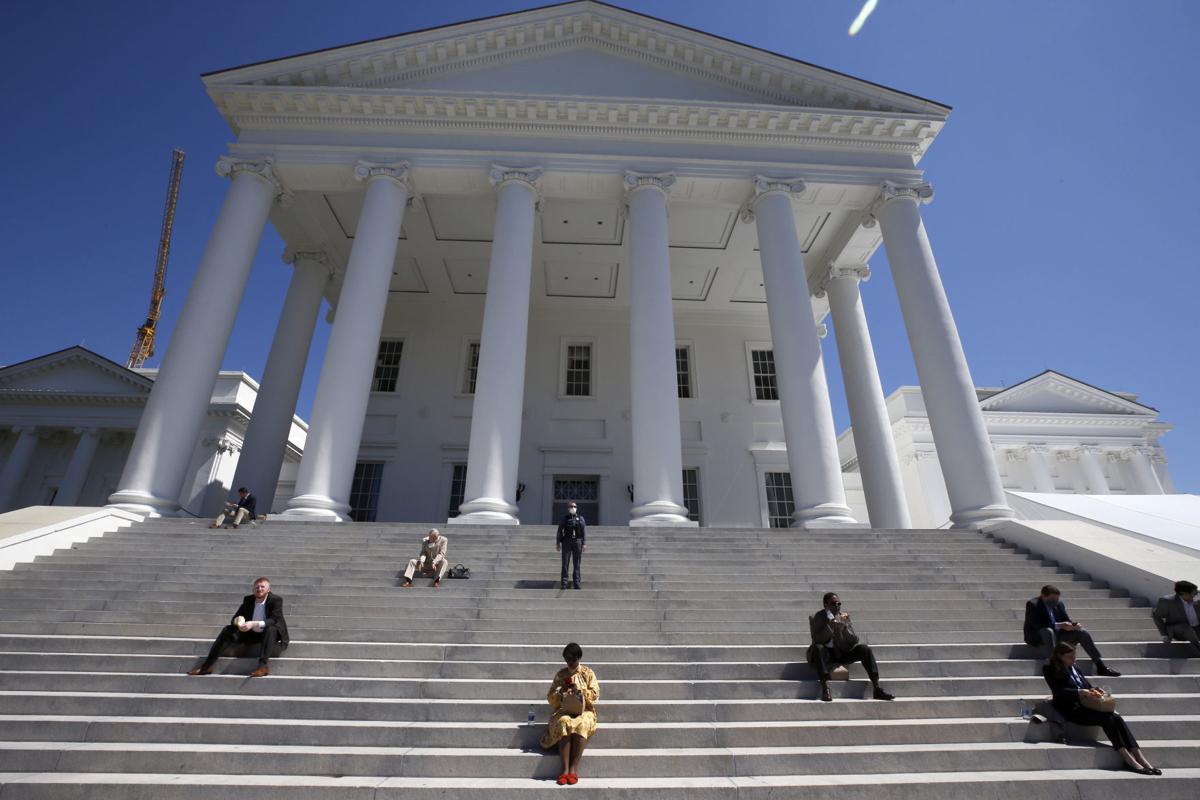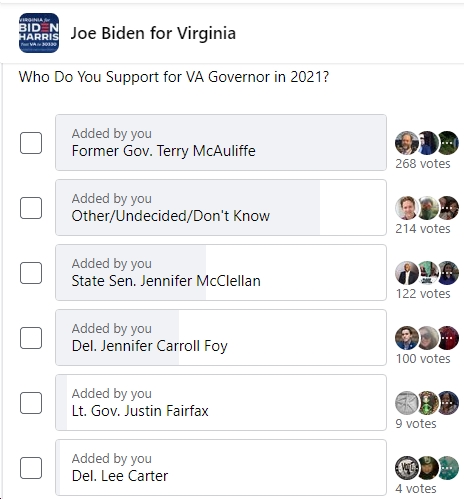Great job by Kellen Squire and thanks for interviewing the Democratic candidates for statewide office. Here’s Kellen’s interview with gubernatorial candidate Sen. Jennifer McClellan, cross-posted from Daily Kos.
KELLEN SQUIRE: Senator, thanks for taking the time to talk today. Real quick, before we get started, I understand you’re a Star Trek nerd, so I have to hit the low-hanging fruit. Kirk or Picard?
SEN. JENNIFER MCCLELLAN: Kirk! I actually took a “Which captain are you?” quiz, and I’m Kirk.
KS: Heh, well, I’m a huge Star Wars nerd, but I know you’re busy, so I’ll save the “Imperial Star Destroyer versus Enterprise-D” or “Picard versus Thrawn” debate for next time, maybe.
So, conventional wisdom—I think as far as the gubernatorial race goes, I’ve heard “stateswoman” or “policy wonk” used a lot in conjunction with you. But I’ve also heard—which is obviously big considering what happened in January in Georgia—a lot of people comparing you to Stacey Abrams, even “before it was cool.” So I was just curious how you’d respond to that.
JM: I’m actually very flattered and honored by that comparison. Stacey is—we knew each other before she ran for governor. We’re both legislators around the same age. At the same time, I admired her work as a legislator and definitely supported her in her race for governor, and in anything she does. So I’m very flattered by that comparison.
KS: Senator, what is the most consequential legislation that you’ve worked on, either as a member of the Senate or the House, and how does it inform your priorities as governor?
JM: It’s hard to pick just one, but I would say the Clean Economy Act, because it really transformed Virginia’s energy policy, making us the first state in the south to make the transition from fossil fuels to 100% clean and renewable energy. It really began unshackling solar and wind, and it addresses climate change in a huge way. But it also will create jobs, and sort of help coming out of COVID—I think it’ll help fuel our economic recovery. And the fact that in one year, Virginia goes from the back of the pack, as far as clean energy policy, to not just the top state in the south, but among the top states in the country? That’s probably the most consequential bill that passed in my 16 sessions in the legislature.
But there’s another one that didn’t get a lot of attention. I think the work I did reforming Virginia’s marriage laws has sort of been top of mind because I saw an article the other day where a judge in India—there was a case where a man raped a girl, I think she was like 13, or 14. And the judge said, “Oh, you should marry her.” And it took me back to two bills I passed.
You know, it used to be the law in Virginia that if you were charged with carnal knowledge with a child, 14 or younger, and you married her? That was a defense. And the way Virginia’s child marriage laws were, if you were 16 or 17, you could get married with your parents’ permission. If you were younger than 16, you could get married with your parents’ permission if the girl was pregnant. And I repealed that defense, and worked to reform Virginia’s child marriage laws. And, the fact that a lot of people think this was just a problem in other countries, but it’s actually been a problem here in Virginia. And sort of that story reminded me of how important it was we fixed that before anybody was talking about it. So I’m very proud of the work we put in on that one.
And last, I’d say the Reproductive Health Protection Act. Because I remember in 2010, when I was the first member of the House to be pregnant while in office—it wasn’t public yet—but I stood on the House floor, fighting against the very first mandatory ultrasound bill that made it to the floor, and we were able to defeat it that year. It ultimately passed, but last year, we passed the Reproductive Health Protection Act and repeal that and the TRAP laws and the 24-hour waiting period. I’m very proud that I was able to just persist, and then roll back some of the biggest restrictions to access to abortion after fighting those same restrictions for so long.
KS: What’s the most important event in the past ten years, that impacts Virginia—whether here in Virginia, nationally, globally—or what small thing was much more pivotal than anybody realized?
JM: So this one is a hard one for a huge history nerd like me. And even thinking that ten years ago is history, heh. Depending on what year you asked me, it would change, but I would have to say it’s the series of events, starting with Donald Trump’s election, and then culminating in George Floyd’s murder, and the reaction to that. And the reason I say it’s a series is because Trump’s election was a wake-up call for a lot of people in Virginia, and in the country, who maybe had never been involved in politics other than voting, but who now realized, “I can’t just sit on the sidelines.”
Beyond that, it was also a moment in a historic cycle, where—starting with the Civil War—every time Black Americans gain social, political and economic power, there was a swift and violent backlash, starting right after reconstruction, all the way to the civil rights movement. And Trump’s election was that next cycle responding to the election of Barack Obama.
But it also started opening people’s eyes to the fact that white supremacy and racism never went away. And it was also the catalyst for the blue wave. But it wasn’t enough to really get Virginians and Americans to focus on the need to address racial inequity and have a reckoning with our past. Then I thought the “Unite the Right” rally would be that moment. And I think it was, for a brief period of time, but it wasn’t sustained. Then I thought the scandals of 2017 would be that moment—but it wasn’t sustained.
But then COVID-19 hit, and we’re in the midst of the worst health crisis in 100 years, the worst economic crisis since the Great Depression. Everyone is sitting at home. And then you see George Floyd murdered online, that goes viral. … I think that moment did for racial justice what TV did for the Vietnam War and the civil rights movement. And that was definitely the flashpoint.
Everything, like Trump’s election, was building up to that moment. And it was like, people who couldn’t see racial inequity now all of a sudden saw it. People who couldn’t see the way white supremacy—that our country was built on a power structure that put white land-owning men at the top—start to see it. People who couldn’t see the pain that Confederate monuments cause, and didn’t know the true story and history of why these statues were there, began to see it.
I live right around the corner from the Robert E. Lee statue on Monument Avenue, and I have neighbors who drove past that statue every day and never thought about. All of a sudden, they come up to me and say, “Hey—that thing needs to come down.” For the Monument Avenue Neighborhood Association to say “We get it now. That needs to come down.” And people who, for some reason, Trayvon Martin, and every single Black person killed by police, like—that wasn’t enough. But George Floyd—that was the moment where they said, “Enough is enough.”
So I think I would say that series of events that started with the Trump election—but definitely COVID-19 economic crisis, and George Floyd’s murder, all hitting right at the same time—is the most transformative moment in Virginian and American history.
KS: To build on that comment, and the systemic crises in our country right now. What do you see as the biggest challenge facing the Commonwealth of Virginia, right now?
JM: So, in the context that I just laid out, it’s “How do we rebuild? How do we rebuild our economy, our healthcare and economic safety net, our education system, in a way that not only builds on the progress that we have made in the last year and a half, but finally begins to break down that inequity, and truly leave no Virginian behind? And how do we do that in a way that addresses a growing loss of faith that people have in the government’s ability to understand their problems, and solve them? That. That is the biggest challenge we face.
And we have to do it in a way that brings people together and gives them hope, again, after four years of chaos. We’re starting to see a light at the end of the tunnel. But sustaining that, and sustaining that hope, while we rebuild … it’s going to be tough. But we have to do it.
KS: I know you’ve spoken at length in the past about your passion for grassroots activism—how does that connect with your run for governor?
JM: Well, if I can, if I can kind of take you back to what got me interested in government to begin with and sort of what sustains me and I’ll kind of leave that story in a little bit.
I grew up in sort of—it’s a somewhat rural to suburban part of Chesterfield County, and my parents are children of the Depression. They lived through Jim Crow. And listening to their stories; my mom grew up in the Gulf Coast in Mississippi, and was the third youngest of 14 children, but was the first in her family to go on to the eighth grade, let alone graduate college. And my dad was the son, the grandson, of teachers, who eventually became a teacher himself. And the more I listened to their stories, the more I came to understand that government is at its best when it’s a force for solving problems, making people’s lives better, and strengthening communities. And at its worst, it’s a force that oppresses some people for the benefit of others.
I decided at 11 years old, after watching a movie about John F. Kennedy, that I wanted to be a part of making government that works for good. So I went to college, got involved in community organizations, joined the Young Democrats, and started working to elect Democrats because I believed the Democratic party was a party that believed in helping to solve people’s problems and making their lives better.
And I think everything I’ve done, firstly as a grassroots organizer, then as a party and community leader, and then again as an elected official, has been talking to people, seeing a problem and saying, “Okay! Let’s fix it.” Seeing someone in pain and wanting to heal their pain. Seeing something wrong and wanting to right it, but knowing that I have to build, I have to work together with everybody affected by that problem, to solve it.
So in the legislature, where I was the youngest woman from the most Democratic district in the House of Delegates, I had to deal with a group which consisted primarily of 50-plus year old white men who are Republicans. I had to try and figure out how to find common ground with some of my constituents’ problems, whether it was somebody whose loved one with autism gets arrested and can’t navigate the criminal justice system, or it’s a domestic worker who makes less than the minimum wage and has no ability to fight and advocate discrimination in her workplace.
And part of why I’m running for governor is because there’s only so much you can do as a legislator to solve those problems. If you’re not setting the agenda, if you’re not reading the budget, if you’re not appointing people who bring that same servant leadership view to government, who don’t wake up every day and say, “How can I help people?” and not, “How can I enforce this regulation that may or may not work?” or “How can I win today.” It’s “How can I help people today?” And that’s like, the core of what my entire life has been, since I sat at my parents’ feet listening to their stories about growing up during the Depression, under Jim Crow.
KS: So you mentioned you live in the Richmond area now, which ties in with the so-called “Urban Crescent” that people think of in Virginia, the population centers of Northern Virginia, Richmond, and Hampton Roads. As you know, I’m an emergency department nurse, and though I work in Charlottesville, I live in a hollow in Barboursville. Rural Virginia—what some people would call ROVA, or the Rest of Virginia—and the issues out here are something I am passionate about, but that seem to often get put by the wayside. How are you going to work for all Virginia as one Commonwealth, united?
JM: Well, I grew up in Matoaca. Probably like half the people I went to school with grew up on tobacco farms. I lived across the street from the Randolph Farm at Virginia State, and I represent a district now that is all of rural Charles City County, suburban Henrico, urban Richmond, and the little college town of Ashland.
I’ve traveled all over the state, either when I was a Young Democrat, or as president of the State Bar Young Lawyers, or the president of the Young Democrats. And what I’ve found is, no matter where you live, we all want the same things. Everybody wants a good job, where they know they can pay their bills and live well. Everybody wants their kids to have a good education. To give their kids a chance to live a better life than they did. Everybody wants to know if they get sick, or injured and go to the doctor and not be bankrupt.
The challenges facing each community are a little different to getting those things. But once you understand that at our core, we all pretty much want the same thing, then it’s important to understand what are your unique challenges to getting it, and what’s your life perspective that frames your political views. When you do that, you can find common ground, and start to solve problems from there.
And again, the whole core of my being is I’m here to solve problems and make people’s lives better. And I can’t do that if I don’t understand who they are, and where they come from, and what their problems are. And so I show up, whether it’s the Northern Neck, or Fairfax, or Gretna, and talk to people. But even more importantly? Listen to people authentically, empathetically, and say, “What are your challenges? And what can I do to help you?” And as governor, I want to not just create a seat at the table for people and perspectives that haven’t been there, but take that table out into the community, so we can meaningfully be a part of the solutions to their problems.
KS: Thank you, Senator. And my last question is, simply: Why is now the time for Jennifer McClellan?
JM: Virginia has been sort of a bellwether for what’s going to happen in the rest of the country. America started here. We, right here in Virginia, are the birthplace of American democracy—but we are also the birthplace of American slavery. So though our history has been complicated, it reflects the history and tenor of the rest of the country.
Virginia has often predicted the political trends that happen in other parts of the country. And I think that’s why all eyes are on Virginia. And that’s why I think now is the right time for me, because Virginians are ready for the next generation of leadership. For somebody who brings both a new perspective for governing, and the experience to get things done and solve people’s problems.
That’s what I’ve done for 15 years as a legislator. For 30 years as a community activist and leader. I have more state government experience than all of my opponents combined, but at the same time, I’ve stayed connected to, and have been working in, our communities to solve their problems. To bring the public servant leadership that Virginia needs as we recover from these four crises of the pandemic, economic crisis, racial injustice, and people’s lack of faith in government.
I bring the perspective of a Black woman and a working mother, both of whom have been the backbone of this country. Who have done the work of helping to build this country. But we’ve never been allowed to lead—and now, we’re not content to sit in the back and do the work anymore.
We want to take our rightful place leading, and help rebuild Virginia and this country, stronger and more united, moving forward past these crises.

